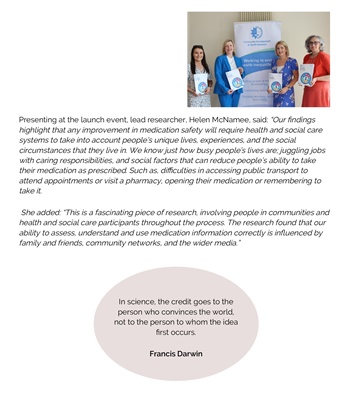
al Link Between Medication Safety and
ualities in NI
Note to editors:
In NI, people from the most disadvantaged communities suffer a heavier burden of illness and
have higher mortality rates than people from the least deprived areas (DoH, Health
Inequalities Report, 2023). 50% more prescription items are dispensed in the most deprived
areas of NI compared to the least deprived (NI General Pharmaceutical Services 2021/22).
In total, 88 people took part in the research focus groups; 63 community participants across
eight focus groups, socially disadvantaged areas and those more at risk of medication related
harm, and 25 people who work in health and social care across four focus groups including
pharmacists, GP and GP practice staff, social workers and domiciliary care staff.
The Department of Health (DoH) launched the Transforming Medication Safety in NI plan
(2020) in response to the World Health Organisation's (WHO) Third Global Patient Safety
Challenge 'Medication without Harm'. The goal is to reduce severe, avoidable medicationrelated harm globally by 50% over the next 5 years.
The research used a Community Based Participatory Research (CBPR) approach. Through this
approach, the stakeholders (people in communities, health and social care, government and
academia) played an integral role in co-constructing the research process. This collaborative
approach not only shaped the research, ensuring people in communities were at the centre
of the work. It also enhanced the stakeholders' knowledge and understanding of the topic.
For further information about the research, please contact Helen McNamee, Research and
Policy Manager, by email at helenmcnamee@cdhn.org
For media enquiries please contact Shannon Keegan, Policy and Communications Officer, by
email at shannon.keegan@cdhn.org